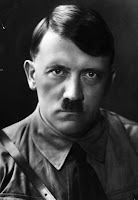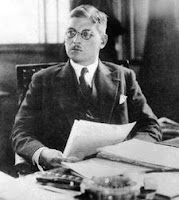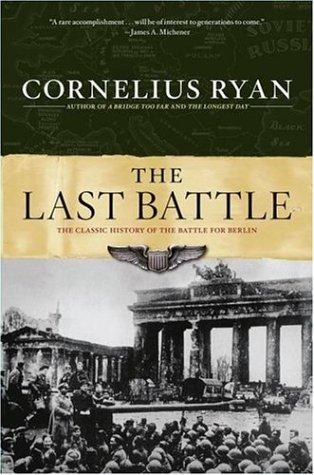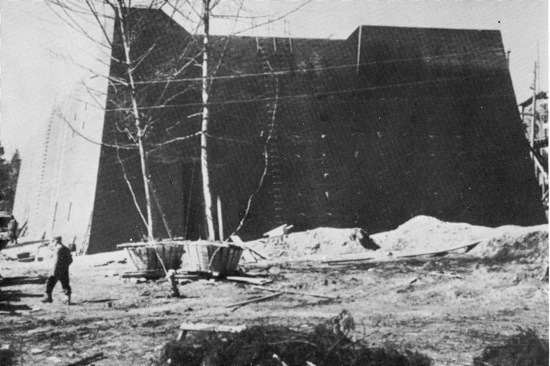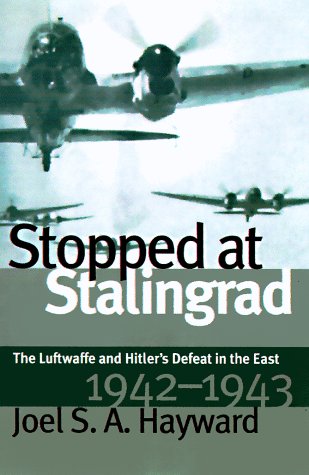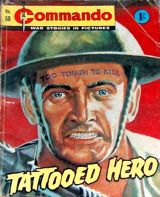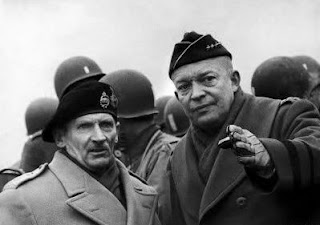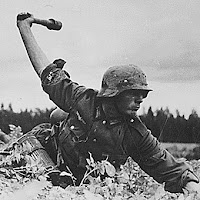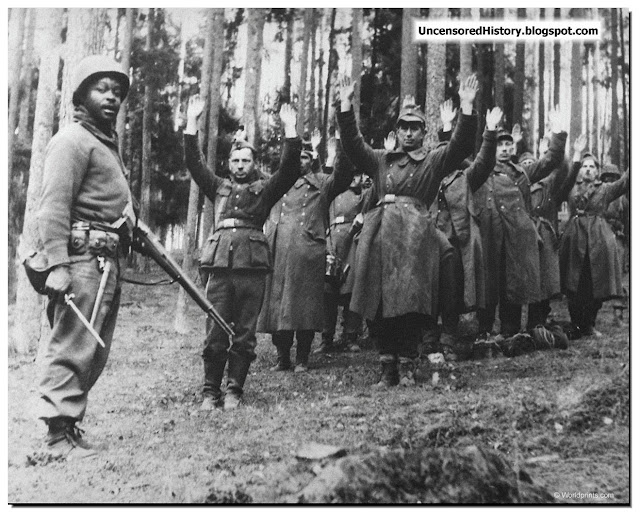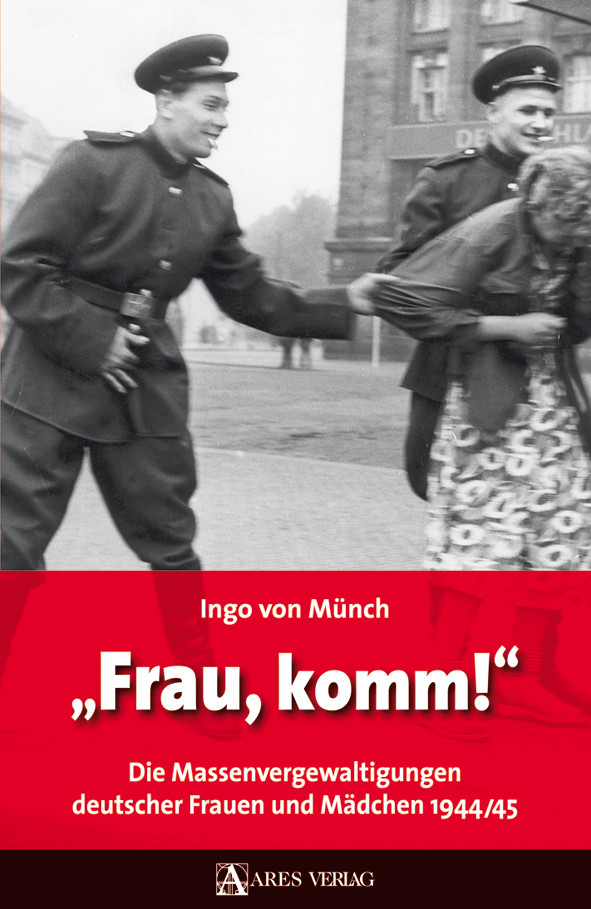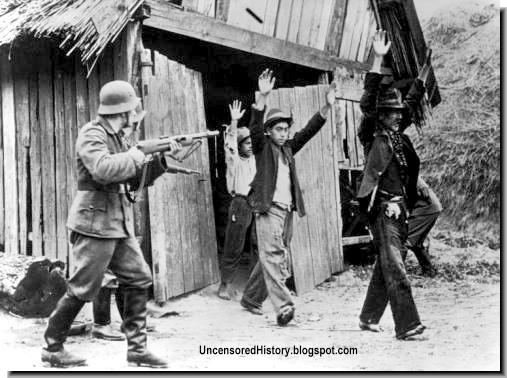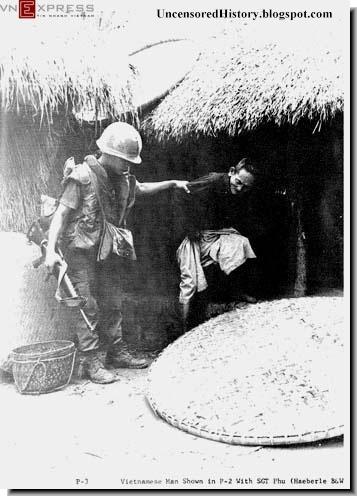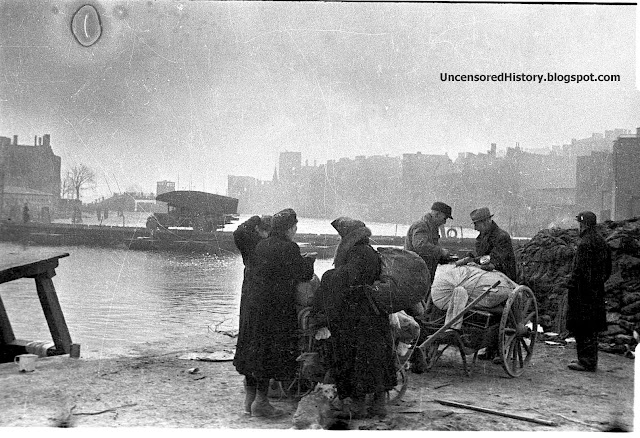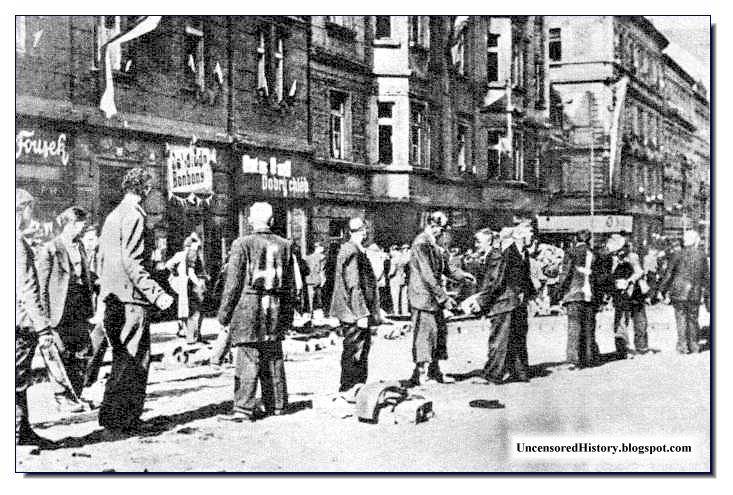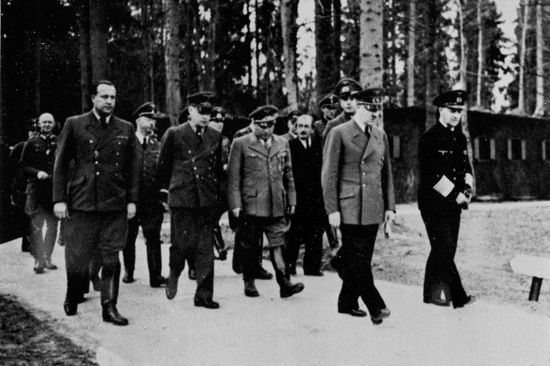 |
| Twelve-year-old Boys – the Cannon Fodder of Last Resort |
Hitler-Jugend troops with boys as young as 12 were widely used in the battle of Berlin as cannon fodder to buy a few hours to Nazi criminals busily fleeing to Switzerland, Argentina, Chile and Uruguay. The boys were dying in the last days and hours of war as obedient, loyal pawns when the fate of the Nazi state was sealed, and their parents, if still alive, damn well knew it. But the parents had been long ago removed from control.
A soviet tank commander recalls: the tanks had limited maneuverability on the narrow streets of Berlin. Suddenly you see a young boy jump on the street in front of the tank. You see a child in the harm’s way and your gut reaction is to cease fire and stop the tank, dead in its tracks. It’s a child!!! – Next thing you know, his faustpatrone has just turned your tank, you and your crew into a raging inferno, all in a span of a second or two.
On March 19th, his 56th birthday, Hitler ventured outside his Reich Chancellery bunker for a solemn reception he gave to a contingent of twenty youths. They were 12-13-year-old boys brought in from the German provinces of Pomerania and Silesia, and each of them was presented as a little hero, having single-handedly knocked out a tank with his Panzerfaust or having killed Russian soldiers. The extraordinary event was captured on a propaganda film and provides some of the most enduring images chronicling the collapse of Hitler's “thousand-year Reich.”
The youngest of these boys was Alfred Czech, a twelve-year-old from Upper-Silesian Oppeln, who had been decorated for rescuing twelve wounded Wehrmacht soldiers and catching a “Soviet spy.” All boys wore the Iron Cross. “You already know what battle is like from your own experience,” says the tottering, senile, hunched-over Führer to the little boys staring at him with worshipful admiration, “and you know that this struggle is for the German people, to be or not to be. In spite of all the hardships at this time, we shall emerge victorious from this battle, especially as I am looking at German youth – at you, my boys.” “Heil, mein Fiihrer!” shouted the boys, brainwashed out of their wits, and out of their childhood, with their eyes agleam with fanaticism. They were then sent back out into the streets to fight and die for the old sociopath-bastard who turned them into his obedient Zombies.
 |
| In 1945 a desperate Hitler and his coterie was throwing boys into battle |
From Moral Cripples to Cripples for Life
On the 3d of March 1945 Wermaht Chief of Staff, Field Marshal Wilhelm Keitel, ordered conscription of any male born in 1929 or earlier. These were 16 and older. Those boys born in 1929 and 1930 were to serve in Volkssturm brigades or in Axmann’s HJ special anti-tank divisions, stationed in or near endangered German towns. By the end of March those brigades were often staffed by boys who had already done much fighting elsewhere and, exhausted and sometimes wounded and maimed for life, represented reserves of the last resort. “Here they are,” wrote Vienna HJ leader Ringler in his diary on March 28, “Willi with his artificial lower leg, Hubert with his shot-off thigh, Hannes with his damaged foot, Schorschi with a prosthesis and head bandage, Karl with his empty sleeve, and all the others, those already recuperated or barely so.”
In the East, by the middle of January 1945, Königsberg was the first important target of the Red Army. There were many Hitler Youth troops on the East Prussian front, in defense of that one-time bastion of the Teutonic Knights. Stalin had intelligence reports of a German atomic program, had intelligence reports of the A-9/A-10 ICBM and futuristic jet air planes ready to unleash Hitler’s vengeance, not to mention continuous mobile V-2 ballistic missile launches into London. The dominant theme for the Red Army’s all-out thrust into Germany was formulated by Marshal Vasily Chuikov, “time is blood” and its marching orders were “to crush” German defenses and take over Berlin at all costs, without delays, ignoring losses, crushing the remnants of the Germany’s war machine. The Red Army was advancing 40 km a day, pulverizing any resistance with tank assaults supported by shock infantry troops and heavy artillery.
Hitler Youths were everywhere in the defense of Königsberg, often armed with machine guns. Soviets would shell them and eventually overrun their positions killing them off in brutal hand-to-hand combat.
In the spring of 1945 the entire eastern front, which the Soviet army was pushing steadily to the West, was sustained in large part by the newly created Hitler Youth battalions, all the way to Vienna. Among them were former flak helpers who had been rushed there from everywhere in the Reich and granted the status of soldiers (their on-going dream) to protect them under the Geneva conventions. When recalling this time, Rolf Noll named comrades as young as thirteen, and he recalled how Russian tank drivers would spot these “soldiers” in hastily created dugouts, then rush their tanks over them, turning on the spot, crushing the boys underneath, as after all is expected in war. Hitler Youth regiment “Frankfurt/Oder” was fighting inBrandenburg under HJ commander Kiesgen trying to delay the Russian onslaught on the capital. In Silesiathere were also such regiments, one in Breslau called “Regimentsgruppe Hitlerjugend,” under HJ leader Herbert Hirsch. Altogether, 1,000 boys were fighting there in two battalions, at least half of those child soldiers perished.
There were eye-witness’ accounts, of course, describing more age-appropriate behavior. A detachment of eighty uniform-clad boys ambushed a column of Soviet tanks and infantry, but things went wrong: the Soviets immediately returned fire, killing and wounding several of HJ. The remaining children, shocked by the swift violence of the action, ran, tossing away their rifles, some crying hysterically, and were mostly captured by the Soviet motorcycled infantry. One youngster, still carrying his Panzerfaust, was asked why he did not shoot it. He replied that he joined the action just to be with his comrades, and that his mother forbade him to shoot, ever.
By the end of March more and more Hitler Youths were being put in trenches, bunkers and machine-gun encasements in strategic spots in Berlin’s suburbs, moved here from places like Brandenburg, Luckenwalde, and Oranienburg. By mid-April 1945, at least 6,000 of them were in the city, under the nominal command of Reich Youth Leader Artur Axmann. Many more were brought in by the end of April.
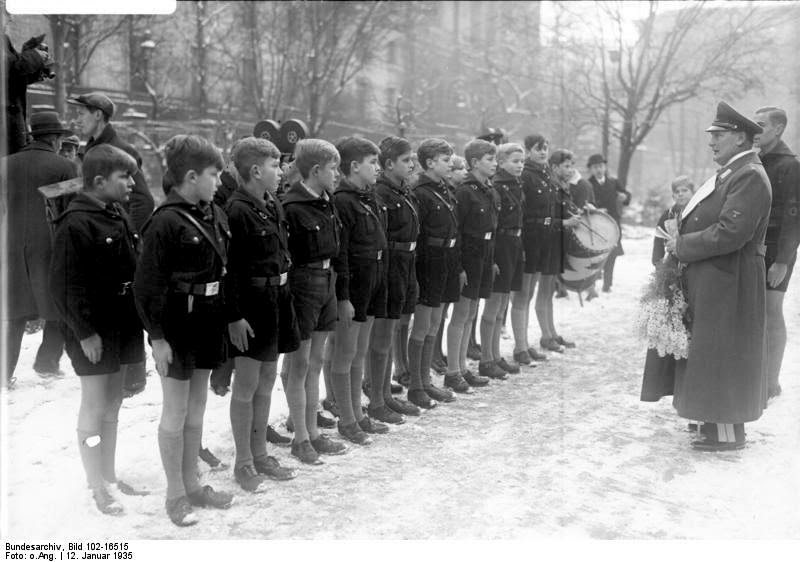 |
| The ground was laid down early. Goering addresses a group of boys in 1935 |
A Regiment of Hitlerjugend Boys Died to Buy Hitler Another Few Minutes
On April 23rd, a regiment made up entirely of Hitlerjugend boys was ordered to defend the Pichelsdorf Bridges by the Havel River. Five thousand boys, wearing man-sized uniforms a few sizes too large, and helmets flopping around on their heads, took positions around the bridges. Armed with rifles, which some of them were barely able to shoot, machine guns and Panzerfausts, they felt invincible and adventuresome in their youthful eagerness to become Hitler’s heroes. Hitler personally planned the operation: bridges were to be defended at all costs, needed for General Wenck's “relief” XII army, advancing from the south-west.
The twelfth Army had a legendary reputation: In the beginning of war, the Army of Greece, which humiliated Italians for 6 months, fell to the same German twelfth’s army. But that was in 1941. Now, it was ordered to break through the Soviet Army, which by the end of the war, in 1945, was a juggernaut. The twelfth Army was ordered to leave the Western front and establish a corridor into Berlin. There was but a minor problem with Hitler’s otherwise “brilliant plan” of the surprise attack from the West – the Soviet 2nd Ukranian front, although surprised at first, quickly bogged down the advance of the twelfth Army and began driving it back.
Amply supplied with Panzerfausts and Faustpatrone, the Hitlerjugcnd boys lay alone or in pairs at irregular intervals in the trenches and foxholes on either side of the Heerstrasse in front of the Pichelsdorf bridges. The boys held off the Soviet tanks for 5 days, their mission senseless, their lives sacrificed for naught: the twelfth army was not fighting eastward into Berlin – it was fleeing westward. The Soviet tanks streamed into Berlin from all directions, via numerous alternative routs, leaving a contingent behind before the Pichelsdorf Bridges. It was methodically destroying the Hitlerjugend regiment, shelling its positions from a safe distance. Out of 5000 HJ troops, less than 500 survived by day 5 of bombardment. They were offered to surrender several times; they refused. When the Soviet Army took over their positions in a final hand-to-hand assault, only a handful was taken alive, still defiant, facing battle-hardened men, some of them the age of their fathers. A Soviet medical officer, while tending to a wounded 10-year-old, remarked in German, “Look what a mess you got yourself into, boy. You should have stayed home with your grandparents.” The HJ spat in the doctors face, hissing, “Heil Hitler!” While these kids held the bridges, Nazi bosses were using the bridges to escape from Berlin, leaving their brave tin soldiers to die.
The same fate befell those HJ’s defending the Olimpic stadium, and the HJ’s sniping from the bunkers and fortifications of Tiergarten (literally: animal park), the park that housed Berlin’s Zoo. The Soviet troops, in their assault on Berlin, found it difficult to inflict significant damage upon the flak towers, the massive futuristic fortifications erected in the Tiergarten and throughout Germany, impervious to bombing or shelling even with the use of the 203 mm Soviet concrete-busting howitzers, firing directly: over 100 direct hits hardly breached one of them. Soviet forces maneuvered around the flack towers to capture Reihcstag and Chancery on the 30th of April.
Unlike much of Berlin, the towers were fully stocked with ammunition and food supplies, and the gunners shelled and sniped the assaulting Red Army units, keeping them at bay. Some towers, including the Zoo Tower, remained in the small enclaves under German control even after the entire city of Berlin had already fallen to the Red Army. The towers were the last to fall to the Soviets, but not before German panzer units staged an all-out attempt to break out from the encirclement, an attempt that failed miserably, resulting in complete destruction of the task force, thus demonstrating absolute futility of further resistance. The Zoo tower remained defiant until capitulation of Berlin’s garrison on the morning of May 2, 1945.
For bravery, the Russian solders awarded the wild goat, which survived an epic gun battle on the grounds of the Zoo, the Nazi Iron Cross, taken off the body of a killed HJ, many of whom – unlike the goat – did not survive.
Hitler committed suicide on April 30th, 1945, when Soviet soldiers were about 200 yards away from the Reich Chancellery and his bunker. The Big Satan was dead. “Do not rejoice in his defeat, you men. For though the bastard is dead, the bitch that bore him is again in heat,” warned Bertolt Brecht.
After Hitler’s death, Martin Bormann (Hitler’s personal secretary) and Artur Axmann (the commander of all Hitlerjugend troops of allGermany) fled Berlin; Several attempts to cross bridges in Tiger tanks failed, but they snuck out at night of May 1. En route, they passed hundreds of corpses of boys, whose lives they wasted to save their own hide. They managed to cross river Spree under the cover of darkness. Bormann was cut down by the gunfire from the Soviet patrols, while Axmann was able to sneak through, and reached Southern Germanywhere he “was captured by the Allies in December of the same year. In 1949, he was tried as a supporter of the Nazis and sentenced to 39 months' imprisonment, but the court ruled that he had already served out his punishment in pre-trial detention.” Except a $24,000 fine imposed by the West German de-Nazification court, about half of his net worth at the time, he lived happily thereafter, working as a salesman in West Berlin. It is really amazing how easy some of the world’s worst criminals get off and how capricious and random is lady Justice in her decisions.
Source: Eric Ross (PhD)
Hitler Youth – Hitler’s Secret Weapon
Not only did thousands of Hitler Youth boys die in Berlin, but many more died in the twelfth’s army attempt to break through the Soviet encirclement toward Berlin. They were the elite core of the troops under the command of General Walter Wenck. At dawn on 28 April, the youth divisions Clausewitz, Scharnhorst and Theodor Körner were in the vanguard of the XII Army’s offensive from the south-west, attempting to break through the Soviet encirclement toward Berlin. They were made up of recent HJ, now young men from the officer training schools, making them some of the best units the German army had. After their 24-km advance towards Berlin, The Red Army halted their assault south-west of Potsdam, some 32 kmfrom Berlin. Genereal Wenck reported that no attack on Berlin was now possible and he was being pushed back. Instead, he set off to help the IX Army, encircled by the Red Army in the Halbe pocket, to break out. Wenck’s mission, although failed, was not entirely in vain, as parts of the German surrounded ninth’s Army, about 25,000 men, managed to break through and unite with the twelfth Army. About 30,000 German soldiers, many of them teenagers, were buried in the cemetery at Halbe. About 20,000 soldiers of the Red Army died trying to stop their assault and breakout.
’Hitler's final battle plan was pie in the sky. Advancing from the south, Marshall Konev's forces cut off and surrounded the Werhmacht's 9th Army in the forest south of Berlin, near the small town of Halbe. 'The massacre in that forest was appalling,' Beevor observed after a visit to the Halbe battlefield. 'There was absolutely no way of treating the wounded, they were just left screaming at the road side…' Over 50,000 [German] soldiers and civilians died. Most of the dead were German, many of them SS. It was the Nazi forces' desperate last stand. One local witness remembers how the narrow paths leading through the forest were piled high with corpses. It took the local population months to clear the site. Even today, a thousand corpses are found each year in and around Berlin. Many of them are detected in the now silent forests of Halbe…
The 12th was an “elite” Army. Many soldiers and officers among the 12th Army were war criminals, “the butchers of Greece” – those who executed the entire civilian populations and blew up villages and towns inGreece and Yugoslavia.
Hitler was more than Father to these brainwashed delinquents, he was God. They were encouraged by the massive propagandist apparatus of the state to rebel against their fathers and to worship Hitler, who replaced family and human love with a glorified, high-minded idea of Death for German Faterland. He handed out a few iron crosses and sent the 12-year-olds to death, which bought him a few more days of miserable existence in a bunker, like a rat. Unlike adults, Hitler Youth were easy victims of brainwashing, just like children are everywhere, including the U.S.with its most sophisticated propagandistic apparatus.
The Unspoken Tragedy of Hitler Youth
The tragedy of Hitler Youth generation is underscored in numbers, although numbers alone can hardly tell the full story. About 12 million German troops were interned by allies, by some estimates. At least 3 million were captured by the Red Army. Of all POW’s at least half were current and former HJ’s. Many former HJ’s were “Waffen-SS [who] received the blood-group tattoo [and]were singled out for special treatment, as were voluntary members of the SS (hence they often tried to remove the stigma by burning or cutting it out, but the scar gave them away like a mark of Cain. All told, however, these hardships scarcely measured up to the levels of sadistic abuse and murder which the SS had inflicted on their victims in the concentration camps, or which the Wehrmacht, for that matter, had practiced in camps for Soviet POWs.”
The formerly triumphant Waffenn SS, who had been often ordered to “wade in blood,” suppressing resistance to German occupation, left behind a trail of blood and destruction, Eastern Europe in ruins, populations of entire villages and towns wiped out or decimated. They were now prisoners of Soviet soldiers many of whom lost their entire families. Although instructed to demonstrate “discipline and high moral standards of a Red Army soldier,” the victors were not liberally-minded, especially so with tough, indoctrinated enemy who fought till the last bullet. The bitter irony of the whole generation was that conditioned to be The Master Race, the Hitler Youth now faced an uncertain future and slave labor, restoring the economies of their former slaves. Many of them died, before seeing home again.
Let us not succumb to the propagandistic effort to misrepresent that only Germans committed atrocities against civilians and kept POW’s in unbearable conditions. Soviet, American, British and French troops were just as guilty, albeit on a smaller scale. From summarily executing German POW’s to raping women, to keeping POW’s in terrible conditions, the cycle of violence continued, now by the victors, until the most painful memories of war faded.
Unfortunately, the pain did not end when the war ended.
 |
| Hitler with a group of boys in late April 1945 |
Key to Effective Brainwashing of Children: Removal of Parental Authority
A child is a moral and political tabula rasa. The Latin phrase means a blank slate, on which his/her grownup teachers and indoctrinators can inscribe any toxic ideology, without having to overcome any resistance from the ethical and moral barriers that allow adults to distinguish good from evil. Tabula Rasa is also featured in Sigmund Freud's psychoanalysis. Freud depicted personality traits as being formed by family dynamics (see, e.g., Oedipus complex, Jocaste complex, Medea complex). According to Freud’s theories, humans lack free will in a sense that they are the product of their upbringing; and also – genetic influences on human personality are minimal when compared to the upbringing. In psychoanalysis, one is largely determined by one's upbringing, and we all intuitively and empirically know this to be a universally acknowledged truth.
Nazis put parents on a leash: they warned parents that interference or failure to cooperate with the Nazi regime would result in imprisonment or having their children sent to other Nazi homes to be reared.
Alfons Heck, who progressed through the Hitlerjugend ranks to become a 17-year-old Bannfuehrer,equivalent to the U.S. rank of major general, commanded thousands of other boys. Once he drew his pistol to shoot a Hitler Youth deserter, but was prevented from doing so by an old Wehrmacht sergeant. Heck admitted afterwards, that he had become intoxicated by the power he wielded. In his two critically acclaimed books, A Child of Hitler: Germany in the Days When God Wore a Swastika[H1], and The Burden of Hitler’s Legacy [H2], Heck described the replacement of his parents’ morality by the Nazi ideology:
“We five- and six-year-olds received a daily dose of Nazi instruction, which we swallowed as naturally as our mother’s milk. The very young became defenseless receptacles for whatever was crammed into us,” especially anti-Semitism. “To us innocents in the Hitler Youth, the Jews were proclaimed as devious and cunning overachievers, especially in their aim of polluting our pure Aryan race, whatever that meant.”
 |
| Learning how to use a machine gun |
Children and adults alike were lead to believe that the war Hitler started was actually unleashed… by Jews. Thus, the Waffen SS recruitment poster, shown here, intended for Flemish speaking Belgians urges to join the SS Langemarck Division. The caption in red says: “Our answer: Pick up your arms and fight!” TheUnited Kingdom (England proper) is personified as a Jew with the Union Jack on his belly, grabbing ontoEurope. It did not matter that in England’s population of 45 million people, Jews numbered about 250 thousand, or 0.5% of the population, and their political and cultural influence was miniscule.
“… My defense of the Hitler-Jugend is that even at sixteen, few of my comrades had any inkling that they were pawns of an evil empire. Bombarded by incessant indoctrination from kindergarten on, and surrounded by adults who were either captivated themselves or lacked the suicidal courage to tell the truth, they never had the luxury of any choice. To expect a child to be that discerning was ridiculous!”
This brainwashing was highly effective because a young boy or a girl was removed from the influence of the parental home at an early age, and if the father or mother objected, the SS would interpret that as a sign of disloyalty toward the Reich, which had life-threatening consequences. The parents were told: Your son is not your personal property, solely at your disposal. He is on loan to you but he is the property of the German Volk. To object to his name being put forward for an elite school is tantamount to insulting the Reich and the Fuhrer."
This indoctrination took years to shake off, but it was shaken-off to varying degrees, albeit with much emotional pain. The children’s identification with the Fuhrer, no matter how intense it once seemed, was actually superficial, because the ersatz father-figure never provided the intense give-and-take of a genuine father-child relationship. They were a generation of “nobody's children,” who were encouraged to rebel against their parents in order to belong to the state. They were psychologically capable of discarding their commitment to Hitler’s dark and mystical ideology of National Socialism, but this process was accompanied by a considerable degree of moral disorientation. They ran out of marching orders, unable to think for themselves. Doesn’t this sound familiar?
Adolf Hitler, the Nazi maniac who mesmerized the German nation for 12 years, formulated the essence of propaganda in his book Mein Kampf (My Struggle,) even today studiously read by politicians, including USpresidents, fishing for clues to political success. Not unlike Hitler who appealed to chauvinism and Anti-Semitism, contemporary US politicians appeal to male-bashing, accusing men of being the source of all evil, while spending a considerable time during the election campaigns kissing babies. “Motherhood and Apple-pie” always worked wonders in America.
Here’s one of Hitler’s gems, from chapter VI:
Propaganda must always address itself to the broad masses of the people. (...) All propaganda must be presented in a popular form and must fix its intellectual level so as not to be above the heads of the least intellectual of those to whom it is directed. (...) The art of propaganda consists precisely in being able to awaken the imagination of the public through an appeal to their feelings, in finding the appropriate psychological form that will arrest the attention and appeal to the hearts of the national masses.
The broad masses of the people are not made up of diplomats or professors of public jurisprudence nor simply of persons who are able to form reasoned judgment in given cases, but a vacillating crowd of human children who are constantly wavering between one idea and another. (...) The great majority of a nation is so feminine in its character and outlook that its thought and conduct are ruled by sentiment rather than by sober reasoning. This sentiment, however, is not complex, but simple and consistent. It is not highly differentiated, but has only the negative and positive notions of love and hatred, right and wrong, truth and falsehood.
Nazi Guerillas, the Werwolf
With capitulation of the Nazi Germany, the war was not over for the Hitler Youth. In various areas, radicals attempted to continue the fight, even months after the final German surrender. Others joined in droves the doomed National Socialist guerilla movement, Werwolf, which terrorized the occupying allied forces. For up to two years after the Nazis surrendered on May 7, 1945, the threat of a Nazi insurgency loomed over Germany. Towards the end of 1944, about 5,000 members of the elite Nazi SS and the Hitler Youth were recruited and sworn into the Werwolf, trained in terrorist tactics and guerilla warfare.
It was a loose network of terrorist sleeper cells, made up of terrified, starving teenagers and fanatical Nazis, some – delusional enough to believe in a Nazi counter-revolution and resurrection, some – malicious enough to carry out a scorched earth policy attacking the allied military units and German civilians to discourage collaboration with Allied forces trying to restore Germany’s democratic traditions. Their tactics varied, but remained typically terroristic: assassinations, sniping attacks and sabotage.
The Berlin Education Department officials were amazed to hear the Soviet General Nikolai Berzarin, the first commandant of Berlin, to say “I want your children to be brought up in the spirit of respect for God.” He ordered all restrictions imposed by the Nazis on the celebration of religious holidays to be annulled. It was a counter-measure, of course: The agnostic Soviet General was advised by NKVD intelligence officers that Hitler Youth could be best described as a Godless Satanic-like cult, a description which was not far off target. Apparently, Werwolf did not appreciate the general’s largess: they ambushed and assassinated General Berzarin on June 16, 1945, a month after the war ended, although NKVD reported that he died in a motorcycle accident, presumably crashing at full speed into a column of military trucks. Similarly, Werwolf assassinated the senior liaison officer of Field Marshal Montgomery, an event which the British press did not cover. There was a Werwolf bombing of a police station, claiming 44 victims, and many other acts of terror.
Less than two months before Germany’s surrender, a Werwolf group comprised of an SS man, 2 HJ boys and a BDM girl executed an order signed by Himmler himself in one of a few notable Werwolf missions: they assassinated the new German lord mayor of Aachen, Franz Oppenhoff, an anti-fascist installed in office by the American troops. The group parachuted from a Nazi-captured American B-17 Flying Fortress, murdered a Dutch border guard, walked into Aachen, killed its lord mayor in his home, then fled, pursued by American soldiers. They all perished, presumably “stepping on the land-mines[3],” but most likely – summarily executed by the American troops. Their suicidal mission gave Goebbels the last chance to gloat about the long arm of the NSDAP, just days before his suicide. Another 2 HJ’s, a 16- and a 17-year old, who parachuted behind American lines, were captured and executed on June-1, 1945, a typical outcome, whether any terrorist actions were carried out or failed. A Pentagon report listed 42 American soldiers “killed as a result of enemy action” after the war, between June and December 1945. But in the year 1946, there were just three.
The Werwolf operations behind the Soviet lines – massacres of civilians and sniping at occupying forces – did not last long, with NKVD capturing the terrorists, then capturing their families, treating them no better than their American collegues.
HOW THE RUSSIANS TREATED THE FEW WEREWOLVES
The members of Werwolf were not treated in kid’s gloves by the Soviet NKVD: Some were executed and some sent to the prisoner camps, to join the Volksturm and Hitlejugend prisoners of war of odd ages, already there. Some kids, in return for being spared beatings or execution, were recruited by the NKVD and, when released, were forced to play along with their Werwolf comrades and act as double-agents provocateurs. The NKVD sought to isolate and destroy the Werwolf centers, arrest and interrogate all its members. Its efforts to “re-educate” the youngsters were focused on confinement and forced labor. The Soviet and German cities and villages were in ruins and could use some forced labor.
“… Among the boys and girls themselves, there was often a happy re-emergence of common sense, which bubbled to the surface even through the thickest muck of ideology and thought control… Thus, a unit of three HJ’s actually slipped through American lines with orders to attack targets of opportunity, but, once across the lines, they almost immediately headed for home, on the way throwing their equipment into a manure pit. This was an act with an unmistakable symbolic resonance. The CIC finally caught up with these young men and interrogated them, although they did not arrest them - 'The boys did not appear to be thoroughly indoctrinated with Nazism, nor did they seem interested in carrying out the mission the Germans had assigned them.’ ” Although thoroughly indoctrinated, these youth were also disillusioned.
















